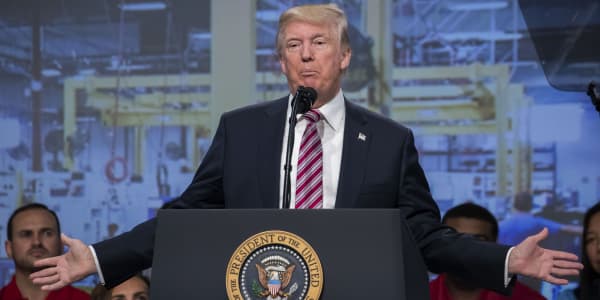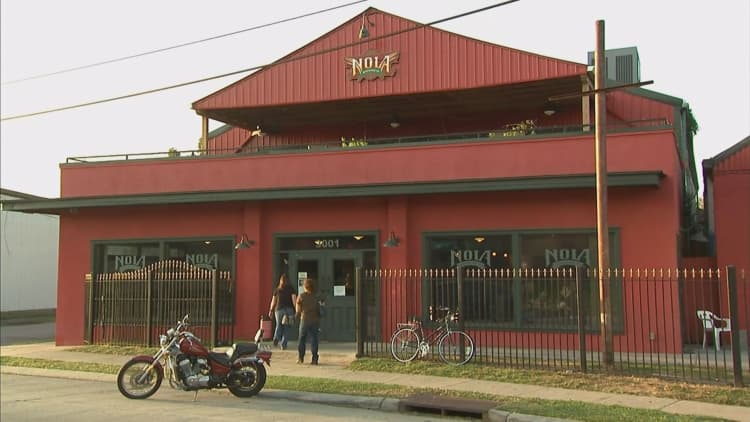
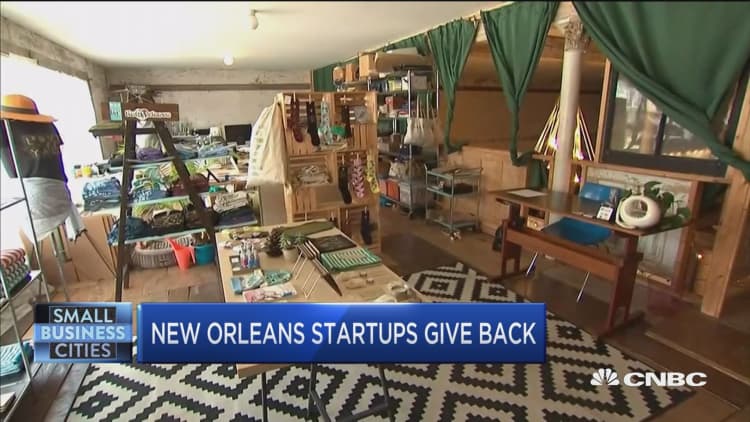
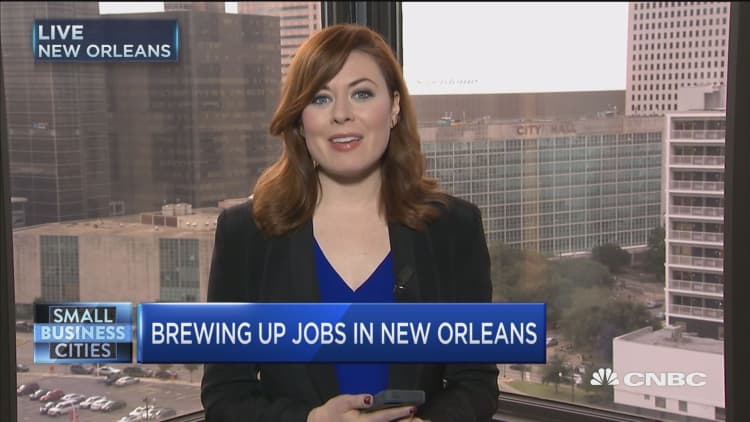
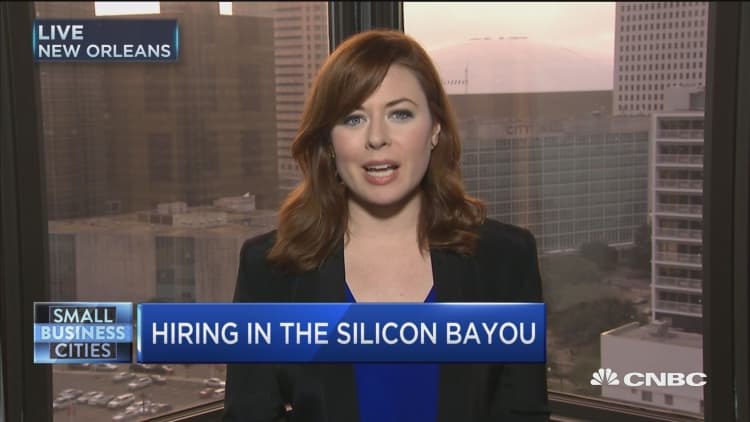
In 2005, New Orleans native Kirk Coco watched the damage caused by Hurricane Katrina unfold with horror from afar in Seattle. The then 37-year-old was serving in the Navy but felt a gravitational pull toward home as the levees broke. He was on his 11th year of duty and ready for a change.
"I promised myself I would get out of the Navy and get back home, where there was absolutely nothing," Coco, now 48, recalls. "All the old restaurants and businesses were shut down; very few places were open. I really wanted to open a business to help create jobs."
So he got to thinking, and after a few beers, he recalled all of the great brewing cities he'd lived while serving, including San Diego. New Orleans' local brewery had relocated to Wisconsin after the storm, and it dawned on Coco that starting a new brewery might be the answer. He went to 29 different banks before securing an $800,000 loan to open NOLA Brewing Company in 2009, in addition to raising $200,000 from private investors by selling shares of the company 1 percent at a time. Today he's since expanded into a second location, NOLA Distilling Company, creating some 50 local jobs along the way, with $4 million in revenue last year.
"New Orleans is like a family; it was like seeing your mom or dad in distress," he said. "I feel like I am part of a really wonderful group of entrepreneurs who have rebuilt the city."
Since the storm, start-ups like Coco's are cropping up throughout the Big Easy, some out of sheer necessity, as the area was decimated. But locals attest, the boom is about more than just rebuilding; it's about bettering the community, with start-ups from the tech and education space to new retail businesses launching.
According to the Data Center, a local community data aggregator, as of 2012 New Orleans led the nation in start-ups per capita at 471 businesses per population of 100,000, compared to the national average of 288. Before Katrina, the city trailed the national average, at 25 percent, according to data from the Kauffman Foundation.
Part of that influx is because the city is one of the least expensive business markets in the nation, according to KPMG, making it appealing to young people. Michael Hecht, president and CEO of Greater New Orleans, an economic development alliance, attributes this to the "low-cost and high-culture" environment of the area, including low cost of living, labor and available office space. The state also offers a 35 percent tax credit for qualified digital media expenditures and a 25 percent tax credit for qualified angel investments.
"Pre-Katrina, New Orleans was a very conservative business environment," Hecht said. "Now, with necessity being the mother of invention and Hurricane Katrina being the biggest and baddest mama of them all, we have been forced to become more inventive."
The social entrepreneur movement
Tippy Tippens represents both reinvention and the migration of younger people moving to New Orleans that Hecht is referring to. The now-42-year-old was living in Brooklyn when the Deepwater Horizon Gulf Oil spill took place in 2010, and wanted to find a way to help raise cash to fund the recovery. She took a research trip to New Orleans for ideas and first learned about the concept of social entrepreneurship.
"I wanted to start a design company of my own but hadn't found a niche yet," Tippens recalls. "When I heard the term social entrepreneurship, it really clicked for me. Designing for good, creating projects to give back made of eco-friendly materials felt like home."
More from iCONIC:
Baltimore's billion-dollar business bet
Money is flowing to start-ups in a city far from Silicon Valley
This Midwestern city is a rising star for entrepreneurs
As it turns out, New Orleans felt like home as well. Her idea turned into Bird Project Soap, selling handcrafted soaps made by local artisans. To launch it, she turned to Kickstarter in 2010 and raised $6,000, with portions of her proceeds going to the Gulf Restoration Network and International Bird Rescue. She moved to the city permanently that same year and launched Goods That Matter, a business that now sells eco-friendly local products — from soaps to stationery.
Tippens operates out of a local store with three additional social entrepreneurs, donating 10 percent of her profits to varying causes. To date she's raised more than $25,000 for projects involving wetlands restoration, animal rescue, literacy and more in and around the New Orleans area.
"There's a phrase I hear a lot downtown, which is, 'A rising tide floats all boats,'" she said. As she explained, New Orleans is a community-based city, and it's very much about everyone doing well, not just individual entrepreneurs.
A community network
Crystal McDonald relied on local resources and the community network Tippens found in New Orleans when launching her business, Acrew, in 2013. McDonald, a former franchisee who attended college in New Orleans, realized she struggled to find employees for her business. She and her co-founder would post opportunities online and in the paper, but found that when it came time for the interview, many wouldn't show.
"I thought there had to be a better way to handle this process," she said. "There really wasn't a lot of innovation in the hourly wage space. What we focus on is targeting employers that are traditionally high turnover — the hourly-wage job market — which is about 70 percent of the American workforce."
She launched Acrew in 2013, a screening platform that connects employers and job-seekers using brief first-impression videos. Users don't need to take time off work or find child care, for example, to get their foot in the door, helping to narrow the no-show rate that McDonald herself experienced as a business owner. Over the past three years they've worked with 10,000 job seekers, raising close to $500,000 in funding. The goal is to scale nationally in the coming year.
Over the past 10 years, New Orleans has set a great example for entrepreneurship.Crystal McDonaldfounder of Acrew
The start-up also participated in a boot camp through Power Moves, a national initiative that started in New Orleans to provide minority entrepreneurs with resources and access to capital.
"Over the past 10 years, New Orleans has set a great example for entrepreneurship," McDonald, now 35, said. "The ecosystem is growing, young businesses are thriving, and we can make our mark as an entrepreneurial community here in the country. We have, through an unfortunate circumstance, seen great fortune and coming together to rebuild. ... There's innovation and a sense of wanting to come together so that everyone is successful."
Back at NOLA Brewing, Coco said he'd like to see more education and investment to help breed the next generation of entrepreneurs, but he feels the rebirth of New Orleans is just the beginning.
"If you came to New Orleans right after Katrina, you were a daring person who was taking a big chance," he said. "Well, that is what an entrepreneur is. We filled that gap perfectly, but we have to continue to embrace change to continue to help us grow."





